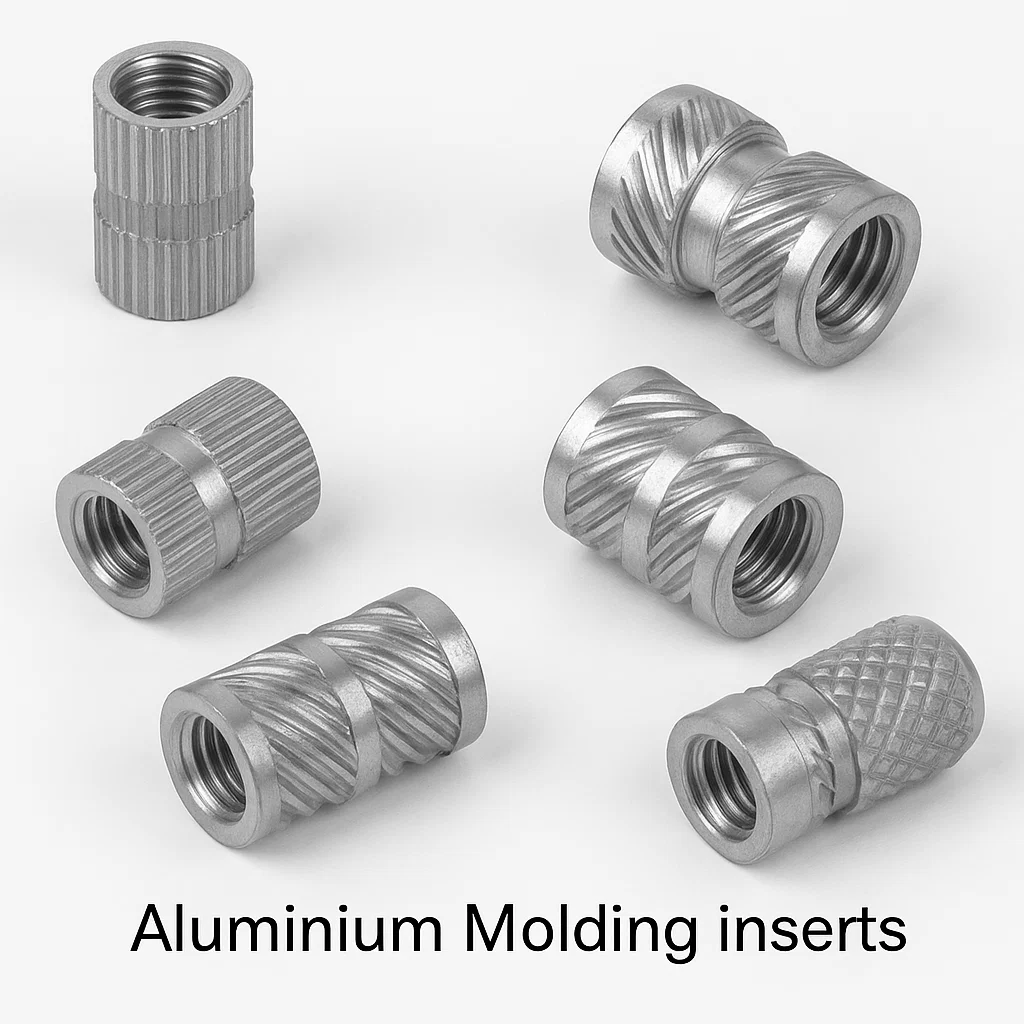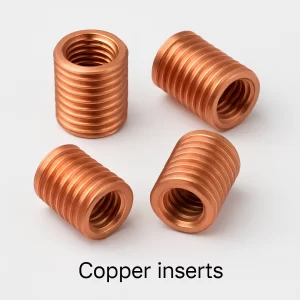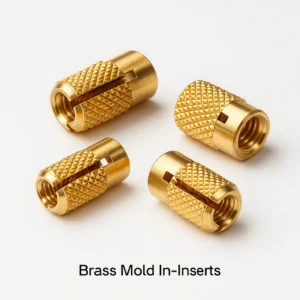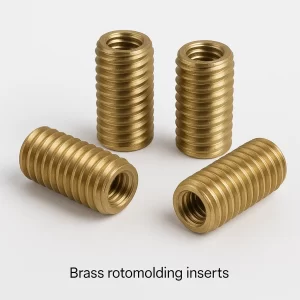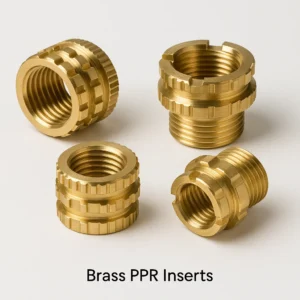Comprehensive Overview of Aluminium Moulding Inserts and Threaded Inserts
We are one of the leading manufacturers and exporters of Aluminium Moulding Inserts and Threaded Brass Inserts from India. We have been supplying precision aluminium threaded inserts, brass knurled inserts, ultrasonic inserts, heat-set inserts, press-fit inserts, and specialty moulding inserts to the world market for many decades. Our state-of-the-art manufacturing facility specializes in producing high-quality aluminium moulding inserts using advanced CNC machining technology, precision turning operations, thread rolling and cutting processes, knurling operations, surface treatment processes, and comprehensive quality testing. With over three decades of global experience in moulding insert manufacturing, we serve diverse industries including aluminium inserts for plastic injection moulding assemblies, brass inserts for electronic enclosures and housings, threaded inserts for automotive interior components, ultrasonic inserts for appliance manufacturing, heat-set inserts for consumer electronics, press-fit inserts for furniture and cabinet assembly, aluminium inserts for medical device housings, brass inserts for telecommunications equipment, threaded inserts for industrial control panels, and moulding inserts for general plastic fabrication. Our expertise encompasses working with various materials including Aluminium 6061-T6 inserts offering excellent strength-to-weight ratio and corrosion resistance, Aluminium 2011 free-machining inserts for high-volume production, Brass C360 inserts providing superior thread strength and durability, Stainless Steel 303/316 inserts for medical and food-grade applications, and specialized materials for demanding environments. We manufacture aluminium moulding inserts ranging from miniature M2 thread inserts for electronics to large M20 thread inserts for industrial applications with lengths from 3mm to 50mm, all maintaining precise thread specifications, accurate knurl dimensions, excellent pull-out strength, consistent installation torque, and reliable performance in plastic moulding, ultrasonic insertion, heat installation, and press-fit assembly applications.
Aluminium Moulding Inserts – Threaded Inserts for Plastics
Aluminium Moulding Inserts represent precision-engineered threaded fasteners designed for permanent installation into plastic components, providing strong, reusable metal threads in plastic parts, enabling reliable assembly and disassembly, excellent pull-out and torque-out resistance, and extending product life through durable threaded connections. These aluminium moulding inserts feature external knurling, grooves, or undercuts for mechanical retention in plastic hosts, precision internal threads for screw assembly, and various installation methods including moulding-in, ultrasonic insertion, heat installation, and press-fitting.
Aluminium moulding inserts find extensive applications in:
- Automotive Industry: Interior trim panel inserts, dashboard assembly inserts, door handle mounting inserts, console box threaded inserts, instrument cluster housing inserts, air vent assembly inserts, and automotive lighting fixture inserts
- Consumer Electronics: Mobile phone housing inserts, laptop and tablet assembly inserts, gaming console threaded inserts, audio equipment mounting inserts, camera housing assembly inserts, power tool plastic body inserts, and electronic device enclosure inserts
- Appliance Manufacturing: White goods assembly inserts, refrigerator component inserts, washing machine panel inserts, microwave housing inserts, air conditioner mounting inserts, vacuum cleaner body inserts, and small appliance threaded inserts
- Furniture and Cabinetry: Plastic furniture assembly inserts, cabinet handle mounting inserts, drawer slide attachment inserts, office furniture component inserts, modular furniture threaded inserts, and knock-down furniture assembly inserts
- Medical Devices: Medical equipment housing inserts, diagnostic device assembly inserts, surgical instrument handle inserts, patient monitor enclosure inserts, medical cart mounting inserts, and healthcare equipment threaded inserts
- Telecommunications: Network equipment housing inserts, router and modem assembly inserts, telecommunications cabinet inserts, fiber optic enclosure inserts, antenna mounting inserts, and communication device threaded inserts
- Industrial Equipment: Control panel enclosure inserts, industrial housing assembly inserts, machinery cover mounting inserts, protective enclosure inserts, junction box threaded inserts, and industrial control device inserts
- Toys and Sporting Goods: Toy assembly inserts, sporting equipment mounting inserts, recreational product threaded inserts, playground equipment inserts, and fitness equipment assembly inserts
Our aluminium moulding insert manufacturing services include engineering consultation for insert selection based on plastic material type, wall thickness, load requirements, installation method, and assembly needs, material recommendation including Aluminium 6061-T6 for optimal strength and corrosion resistance, Aluminium 2011 for high-speed machining and volume production, Brass C360 for maximum thread strength and durability, Stainless Steel 303/316 for corrosive environments and medical applications, and material selection guidance based on galvanic compatibility with plastic additives, custom insert design for special thread sizes, unique knurl patterns, application-specific features, or proprietary geometries, prototype development with installation testing, pull-out strength evaluation, and torque testing, production manufacturing using precision CNC turning, thread rolling, and knurling operations, various insert types including ultrasonic inserts with diamond or straight knurl patterns for ultrasonic welding installation, heat-set inserts (thermal inserts) with undercut features for hot installation, press-fit inserts with interference knurls for cold press installation, moulding-in inserts with deep knurls or grooves for overmoulding, self-tapping inserts cutting their own cavity during installation, expanding inserts with split body design, and threaded studs for dual-sided assembly, thread specifications including metric threads M2 to M20 (ISO standard), unified threads #2-56 to 1/2″-13 (UNC/UNF), custom thread pitches and forms, precision thread tolerances 6H or better, and thread length options from blind to through configurations, knurl patterns including diamond knurl (30°, 45°, 60° angles) for maximum retention, straight knurl for directional resistance, helical knurl for ultrasonic insertion, depth-controlled knurl for consistent installation, and custom knurl geometries for specific plastic materials, dimensional capabilities from miniature M2 x 3mm inserts for small electronics to large M20 x 50mm inserts for industrial applications, standard lengths 1.5D to 3.0D (D = major thread diameter), custom lengths from 3mm to 50mm, outside diameters from 3mm to 30mm, and wall thickness optimized for strength and installation, tolerance specifications including thread tolerance 6H class standard (tighter available), outside diameter ±0.05mm, length tolerance ±0.2mm, concentricity between thread and OD within 0.05mm TIR, and perpendicularity of face to thread axis within 0.05mm, surface treatments including clear anodizing (Type II, 5-15 microns) for corrosion protection, hard anodizing (Type III, 25-50 microns) for wear resistance, black anodizing for aesthetic appearance, passivation for stainless steel inserts, and electroless nickel plating for brass inserts, mechanical properties including pull-out strength 500N to 5000N depending on size and plastic, torque-out resistance 1-20 Nm based on thread size, installation torque specifications, ultimate tensile strength of insert material 310 MPa (6061-T6) to 450 MPa (brass C360), and fatigue resistance for repeated assembly cycles, and complete documentation including material certificates with alloy verification, dimensional inspection reports with thread gauge verification, mechanical test results including pull-out and torque testing, installation procedure guidelines, and compliance certifications.
We accommodate aluminium moulding insert production from small quantities for prototypes and custom designs to high-volume production exceeding 10 million pieces annually for automotive and electronics OEMs, with material specifications conforming to ASTM B211 for aluminium alloy bars and rods, ASTM B221 for aluminium alloy extruded bars, ASTM B16 for free-cutting brass rod, ISO 8839 for self-tapping threaded inserts, DIN 16903 for threaded inserts for plastics, and customer-specific requirements. Lead time typically ranges from four to six weeks for custom designs including engineering, material procurement, CNC programming, production setup, manufacturing, surface treatment, testing, and documentation, with shorter lead times of 1-2 weeks for standard catalog sizes from maintained inventory.
Material Specifications and Insert Types
Material Specifications for Moulding Inserts
| Material Grade | Key Properties | Typical Applications | Standards |
|---|---|---|---|
| Aluminium 6061-T6 | Excellent strength-to-weight, 310 MPa tensile, corrosion resistant, lightweight | General purpose inserts, automotive, electronics, consumer products | ASTM B211, B221, ISO 6361 |
| Aluminium 2011-T3 | Free-machining, 380 MPa tensile, high-speed production | High-volume production, cost-sensitive applications | ASTM B211, DIN EN 573-3 |
| Brass C360 | High strength 450 MPa, excellent machinability, superior thread strength | Heavy-duty applications, high torque requirements, durable assemblies | ASTM B16, CDA 360 |
| Stainless 303 | Corrosion resistant, 620 MPa tensile, free-machining | Medical devices, food equipment, corrosive environments | ASTM A582, DIN 1.4305 |
| Stainless 316 | Superior corrosion resistance, 580 MPa, marine grade | Marine applications, chemical exposure, medical implants | ASTM A276, DIN 1.4401 |
Insert Types and Installation Methods
Ultrasonic Inserts: Diamond or straight knurl patterns designed for ultrasonic welding installation, high-frequency vibration melts surrounding plastic, insert settles into molten plastic cavity, rapid installation (2-4 seconds per insert), excellent for thermoplastics (ABS, PC, PP, PA, POM), suitable for automated assembly, pull-out strength 70-90% of theoretical maximum, typical outside diameter 1.2-1.5 times thread major diameter.
Heat-Set Inserts (Thermal Inserts): Undercut or barbed features for hot installation, heated insert (200-350°C) pressed into undersized hole, plastic melts and flows around features, cooling provides mechanical lock, installation time 5-10 seconds, suitable for all thermoplastics, excellent pull-out strength 80-95% maximum, requires thermal installation equipment, minimal stress on plastic part.
Press-Fit Inserts: Interference knurl design for cold press installation, insert pressed into slightly undersized hole, plastic deforms elastically around knurl, no heat or ultrasonic energy required, installation force 500-5000N depending on size, suitable for rigid plastics (ABS, PC, PA), faster installation than heat-set, pull-out strength 60-80% maximum, lower equipment cost.
Moulding-In Inserts: Deep knurl or groove patterns for overmoulding, insert placed in mould cavity before injection, molten plastic flows around insert features, strongest retention method achieving 90-100% maximum, requires mould design consideration, excellent for high-volume production, eliminates secondary installation operation, suitable for all thermoplastics and thermosets.
Self-Tapping Inserts: Cutting threads on external body, insert taps its own cavity during installation, spiral flutes evacuate displaced plastic, suitable for thick-walled parts, simple installation without special equipment, lower initial holding strength improving over time, good for field installation and repairs.
Expanding Inserts: Split body design with internal wedge, installation force expands insert diameter, mechanical lock through radial pressure, excellent for thin-walled applications, removable and relocatable, suitable for soft plastics, lower pull-out strength than other types.
Manufacturing Process and Quality Control
Precision CNC Machining Operations
Bar stock material procurement with certified mill test reports, CNC Swiss-type automatic lathes for complex geometries and high-volume production, multi-spindle CNC turning centers for efficient manufacturing, operations including facing, turning outer diameter to precise specifications, drilling and boring internal features, thread cutting or rolling for internal threads, knurling operations creating retention features, grooving and parting, chamfering and deburring, and secondary operations if required.
Thread Manufacturing
Thread cutting using precision single-point tools for custom threads, thread rolling using cylindrical dies for high-strength rolled threads (10-30% stronger than cut threads), thread grinding for precision threads and hard materials, thread milling for large or special threads, thread inspection using thread plug gauges (6H tolerance standard), optical comparators for thread form verification, and functional testing with mating screws.
Knurling Operations
Diamond knurling creating cross-hatch pattern (30°, 45°, or 60° helix angles), straight knurling producing parallel ridges, knurl depth control within ±0.05mm for consistent performance, knurl pitch selection based on plastic material and wall thickness (0.5mm, 0.8mm, 1.0mm, 1.2mm common), before-knurl diameter calculation ensuring proper finished dimension, and knurl tool maintenance for consistent pattern quality.
Surface Treatment Processes
Cleaning and degreasing removing machining oils, anodizing bath preparation for aluminium (sulfuric acid electrolytic process), Type II anodizing creating 5-15 micron coating for standard corrosion protection, Type III hard anodizing producing 25-50 microns for wear resistance, dye application for colored finishes (black, blue, red, gold, clear), sealing process closing anodic pores, passivation for stainless steel creating protective chromium oxide layer, and electroless nickel plating for brass providing corrosion protection.
Quality Control and Testing
Dimensional Inspection: Coordinate measuring machines (CMM) verifying all critical dimensions, optical comparators projecting magnified profile for visual verification, micrometers and calipers for diameter and length measurement, thread plug gauges (Go/No-Go) confirming thread specifications, pin gauges verifying internal diameters, and surface roughness measurement using profilometers.
Mechanical Testing: Pull-out strength testing in representative plastic samples using tensile testing machines, torque-out resistance measurement applying rotational force until failure, installation torque monitoring during representative assembly, push-out testing for press-fit inserts, fatigue testing simulating repeated assembly cycles, and statistical analysis ensuring consistent performance.
Material Verification: Spectrographic analysis confirming alloy composition, hardness testing using Rockwell or Vickers methods, tensile testing of representative samples, metallographic examination of grain structure, and material certificate review.
Statistical Process Control: Control charts monitoring key dimensions including thread size, outside diameter, length, and knurl depth, process capability studies calculating Cp and Cpk indices (target Cpk >1.33), trend analysis identifying tool wear or process drift, and automated data collection from measuring equipment.
Insert Selection Guide and Design Recommendations
Plastic Material Compatibility
ABS (Acrylonitrile Butadiene Styrene): Excellent with all insert types, moderate strength, ultrasonic and heat-set preferred, boss diameter 2.0-2.5 times insert OD, typical wall thickness 2.5-3.5mm.
PC (Polycarbonate): Compatible with all methods, high strength, excellent ultrasonic welding, heat-set requires lower temperature (250-280°C), boss diameter 2.0-2.5 times OD, wall thickness 3.0-4.0mm.
PA (Polyamide/Nylon): Good with all types, hygroscopic material requires dry conditions, ultrasonic preferred, heat-set effective, boss diameter 2.5-3.0 times OD, wall thickness 3.0-4.5mm, consider moisture absorption effects.
PP (Polypropylene): Challenging for ultrasonic (low stiffness), heat-set and moulding-in preferred, press-fit requires higher force, boss diameter 2.5-3.5 times OD, wall thickness 3.5-5.0mm, higher temperatures for heat-set (300-350°C).
POM (Acetal/Delrin): Excellent with ultrasonic, heat-set, and press-fit, high strength and stiffness, boss diameter 2.0-2.5 times OD, wall thickness 2.5-3.5mm, precise hole tolerances critical.
PE (Polyethylene): Difficult for ultrasonic, moulding-in and heat-set preferred, soft material requires larger boss, boss diameter 3.0-4.0 times OD, wall thickness 4.0-6.0mm.
PBT (Polybutylene Terephthalate): Compatible with all methods, similar to PA, good ultrasonic characteristics, boss diameter 2.0-2.5 times OD, wall thickness 3.0-4.0mm.
Boss Design Guidelines
Boss Diameter: Ultrasonic/heat-set inserts: 2.0-2.5 times insert OD for rigid plastics, 2.5-3.0 times for semi-rigid, 3.0-3.5 times for flexible plastics. Press-fit inserts: add 0.2-0.5mm to above recommendations for stress distribution.
Boss Height: Minimum equal to insert length, recommended 10-20% longer than insert for process variation, maximum 3 times boss diameter to prevent sink marks, taller bosses require ribbing for support.
Hole Diameter: Ultrasonic inserts: 0.10-0.15mm smaller than insert OD (interference fit), heat-set inserts: 0.15-0.25mm smaller than OD, press-fit inserts: 0.05-0.15mm smaller, moulding-in: 0.05-0.10mm larger (clearance fit), hole tolerance ±0.05mm critical for consistent installation.
Hole Depth: Blind holes: 0.5-1.0mm deeper than insert length allowing debris clearance, through holes: ensure adequate support below insert, chamfer hole entrance 0.3-0.5mm x 45° facilitating insert alignment.
Wall Thickness: Maintain consistent wall thickness around boss, minimum 50-75% of boss outer diameter, avoid thick sections causing sink marks, use ribs for reinforcement rather than solid walls.
Rib Design: Connect boss to part walls using ribs 40-60% of nominal wall thickness, minimum 3 ribs at 120° spacing for small bosses, 4 ribs at 90° for larger bosses, rib height equal to boss height providing support.
Insert Size Selection
Thread Size Selection: Choose insert thread matching fastener specification, consider torque requirements (larger threads for higher torque), evaluate space constraints (smaller threads for compact assemblies), assess pull-out load requirements.
Length Selection: Standard lengths: L = 1.5D to 2.0D for general applications (D = major thread diameter), L = 2.0D to 3.0D for high-stress applications, L = 1.0D to 1.5D for thin-walled parts with space limitations, custom lengths available for special requirements, longer inserts provide higher pull-out strength but require deeper bosses.
Outside Diameter Selection: Balance between retention strength and plastic stress, larger OD provides more surface area and retention, excessive OD creates high installation stress potentially cracking plastic, typical OD ranges: 1.2-1.3 times major diameter for ultrasonic/press-fit, 1.3-1.5 times for heat-set/moulding-in.
Performance Specifications and Testing
Pull-Out Strength Performance
| Thread Size | Insert Type | Typical Pull-Out Strength in ABS | Typical Pull-Out Strength in PA6 | Installation Method |
|---|---|---|---|---|
| M2 x 3mm | Ultrasonic | 150-200N | 200-250N | Ultrasonic welding |
| M3 x 4mm | Heat-Set | 250-350N | 350-450N | Thermal installation |
| M4 x 6mm | Ultrasonic | 450-600N | 600-800N | Ultrasonic welding |
| M5 x 8mm | Heat-Set | 800-1100N | 1100-1400N | Thermal installation |
| M6 x 10mm | Moulding-In | 1200-1600N | 1600-2000N | Overmoulded |
| M8 x 12mm | Heat-Set | 1800-2400N | 2400-3000N | Thermal installation |
| M10 x 15mm | Moulding-In | 2800-3600N | 3600-4400N | Overmoulded |
Torque Resistance Performance
| Thread Size | Material | Strip Torque in Plastic | Prevailing Torque | Maximum Assembly Torque |
|---|---|---|---|---|
| M2 | Aluminium | 0.3-0.5 Nm | 0.05-0.10 Nm | 0.15-0.25 Nm |
| M3 | Aluminium | 0.6-0.9 Nm | 0.10-0.15 Nm | 0.30-0.45 Nm |
| M4 | Aluminium | 1.2-1.8 Nm | 0.15-0.25 Nm | 0.60-0.90 Nm |
| M5 | Brass | 2.0-3.0 Nm | 0.25-0.40 Nm | 1.00-1.50 Nm |
| M6 | Brass | 3.5-5.0 Nm | 0.40-0.60 Nm | 1.75-2.50 Nm |
| M8 | Brass | 6.0-9.0 Nm | 0.60-1.00 Nm | 3.00-4.50 Nm |
| M10 | Brass | 10-15 Nm | 1.00-1.50 Nm | 5.00-7.50 Nm |
Industries and Application Examples
Automotive Interior Components: Dashboard assembly using M4-M6 heat-set inserts for removable panels and access covers, door handle mounting with M5-M6 brass inserts for durability, center console attachment using M4-M5 ultrasonic inserts for efficient assembly, glove box hinges and latches with M3-M4 inserts, air vent assembly with M3 inserts for adjustable louvres.
Consumer Electronics: Laptop and tablet assembly with M2-M3 heat-set inserts for miniature form factors, smartphone housings using M1.6-M2 ultrasonic inserts for rapid assembly, gaming console enclosures with M3-M4 moulding-in inserts for structural integrity, audio equipment with M4-M5 brass inserts for vibration resistance, power tool housings using M5-M8 heat-set inserts for handle attachment.
Appliance Manufacturing: Refrigerator door handle mounting with M6-M8 brass inserts for repeated use, washing machine control panel assembly using M4-M5 heat-set inserts, microwave housing with M4 ultrasonic inserts for rapid production, vacuum cleaner body assembly with M5-M6 inserts for structural components, small kitchen appliance housings using M3-M4 inserts for handle and base attachment.
Medical Devices: Diagnostic equipment housings with 316 stainless steel M4-M6 inserts for sterility, patient monitor enclosures using medical-grade M5 inserts, surgical instrument handles with M3-M4 stainless inserts for repeated sterilization, medical cart assembly with M6-M8 inserts for load-bearing attachments, healthcare device enclosures using passivated inserts for cleanroom compatibility.
Telecommunications Equipment: Network router housings with M3-M4 heat-set aluminium inserts, modem enclosure assembly using M4 ultrasonic inserts, telecommunications cabinet mounting with M5-M6 brass inserts for outdoor installations, fiber optic equipment with M4 inserts for cover attachment, antenna mounting brackets using M6-M8 inserts for structural support.
Frequently Asked Questions
Q1: What is the difference between ultrasonic and heat-set inserts? Ultrasonic inserts use high-frequency vibration (20-40 kHz) to melt surrounding plastic, installation takes 2-4 seconds, requires ultrasonic welding equipment, excellent for high-volume automated assembly, lower equipment cost than heat installation. Heat-set inserts use heated insert (200-350°C) pressed into undersized hole, installation takes 5-10 seconds, requires thermal press equipment, provides slightly higher pull-out strength (5-10% more), better for thick-walled parts and variety of plastics. Both methods provide excellent results – selection based on production volume, equipment availability, and plastic material.
Q2: How do I determine the correct boss size for my plastic part? Boss diameter depends on plastic material stiffness and insert type. General formula: Boss OD = Insert OD × (2.0 to 3.0). Rigid plastics (ABS, PC, POM): use 2.0-2.5 multiplier. Semi-rigid plastics (PA, PBT): use 2.5-3.0 multiplier. Flexible plastics (PP, PE): use 3.0-3.5 multiplier. Boss height should equal or slightly exceed insert length plus 10-20% tolerance. Maintain wall thickness around boss at 50-75% of boss diameter. Use ribs for support rather than solid walls. Our engineering team provides free boss design analysis with insert quotations.
Q3: Can aluminium inserts be used in outdoor or corrosive environments? Anodized aluminium inserts provide excellent corrosion resistance for outdoor applications. Type II anodizing (5-15 microns) suitable for general outdoor exposure and mild corrosive environments. Type III hard anodizing (25-50 microns) recommended for marine, chemical, or harsh industrial environments. For maximum corrosion resistance, specify stainless steel 316 inserts particularly for saltwater, chemical exposure, or medical applications. Brass inserts with electroless nickel plating offer good corrosion protection for indoor and moderate outdoor use.
Q4: What installation equipment is required for different insert types? Ultrasonic inserts: Ultrasonic welding equipment (20-40 kHz), power requirements 200-2000W depending on insert size, custom horn/fixture for part, investment $3,000-$15,000. Heat-set inserts: Thermal insertion press with temperature control, heated installation tips (soldering iron style or production press), investment $500-$10,000 depending on automation level. Press-fit inserts: Arbor press or pneumatic press, simple fixturing, lowest equipment cost $200-$2,000. Moulding-in: No installation equipment (incorporated during injection moulding). Installation equipment recommendations provided with insert orders.
Q5: What are typical lead times and minimum order quantities? Standard catalog inserts (common thread sizes M2-M10, standard lengths): 1-2 weeks, MOQ 1,000-5,000 pieces. Custom sizes or specifications (special threads, lengths, knurl patterns): 4-6 weeks including tooling, programming, production, and surface treatment, MOQ 5,000-20,000 pieces depending on complexity. Prototypes and samples: 50-200 pieces available within 1-2 weeks for evaluation and testing. High-volume production (>100,000 pieces): volume pricing with 10-30% discount, blanket orders with scheduled releases available. Express production available with surcharge for urgent requirements.
Why Choose Our Aluminium Moulding Insert Services
- Three Decades of Insert Manufacturing Excellence: 30+ years producing precision moulding inserts for automotive, electronics, appliances, medical devices, and industrial equipment worldwide
- Comprehensive Material Options: Aluminium 6061-T6 and 2011, Brass C360, Stainless Steel 303/316, all with full material certification and traceability
- Advanced CNC Manufacturing: Swiss-type automatic lathes, multi-spindle CNC turning centers, precision thread rolling equipment, automated knurling systems
- Complete Size Range: M2 to M20 metric threads, #2-56 to 1/2″-13 unified threads, lengths 3mm to 50mm, custom sizes and configurations available
- All Installation Types: Ultrasonic inserts, heat-set inserts, press-fit inserts, moulding-in inserts, self-tapping inserts, expanding inserts
- Quality Certification: ISO 9001:2015 certified, compliance with ISO 8839, DIN 16903, ASTM standards, complete dimensional and mechanical testing
- Engineering Support: Free boss design analysis, insert selection guidance, installation procedure development, pull-out testing, technical problem solving
- High-Volume Production Capacity: Automated CNC equipment producing 10+ million inserts monthly, consistent quality across large production runs
- Competitive Pricing: India manufacturing providing 35-45% cost savings versus North American or European manufacturers while maintaining international quality standards
- Global Export Experience: Serving automotive OEMs, electronics manufacturers, appliance companies, medical device firms worldwide with established logistics
Contact Us Today
Ready to discuss your aluminium moulding insert requirements for plastic assemblies, product development, or high-volume production? Our experienced engineering and sales team is here to help.
Request a Quote: Send specifications including thread size, length, insert type, material, surface finish, quantity, and plastic material to sales@jambrass.com for detailed quotation within 24 hours. Include drawings or samples for custom configurations.
Call Us: +91-22-43449300 / +91-22-43449323 (Monday-Saturday, 9:00 AM – 6:00 PM IST)
Office Address: 1406, 14th Floor, Dalamal Tower, Nariman Point, Mumbai – 400021, Maharashtra, India
Factory Address: Plot 10B, GIDC Industrial Estate, Shanker Tekari, Udyognagar, Jamnagar, Gujarat, India – 361004
Contact Person: Mr. Mehul Vora
Email: sales@jambrass.com

